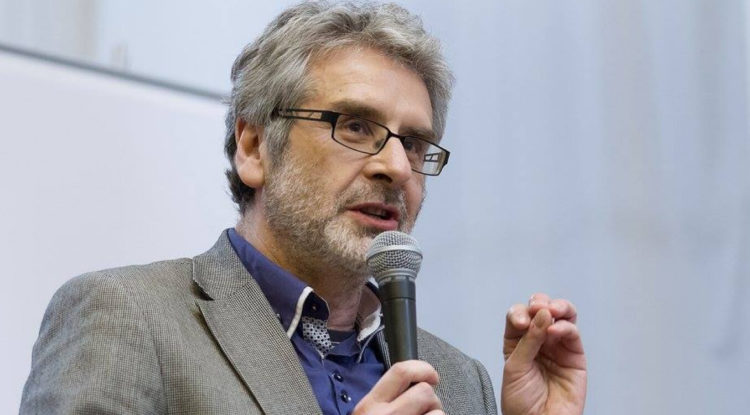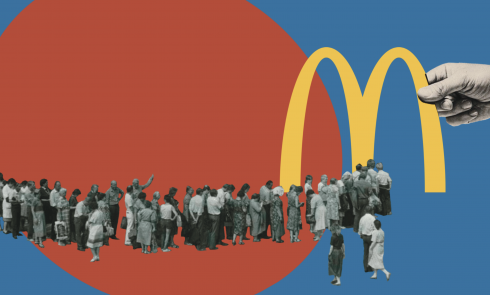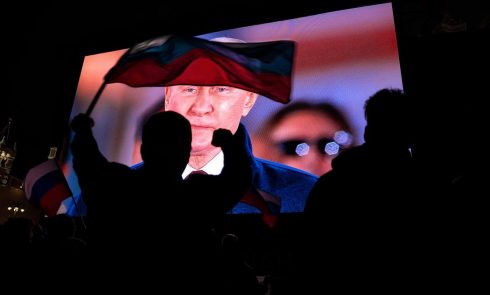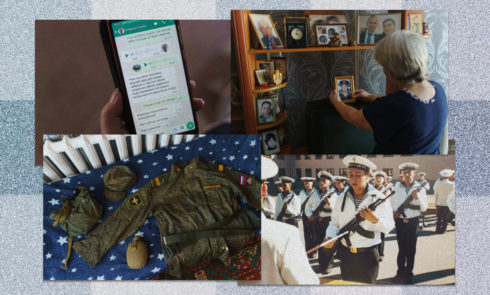Alexander Etkind is a historian, philologist, and professor at the Central European University in Vienna, and former instructor at Cambridge. His books on colonization, intellectual history, and cultural memory have been translated into many languages and continue to help Western intellectuals understand Russia. In his new book, Russia Against Modernity, Etkind presents the invasion of Ukraine as part of the Russian state's larger war against progress—the ecological, social, and cultural challenges of the 21st century. Holod’s editor Maxim Zagovora spoke with Etkind about what this war is about and when it will end.
Your book is called Russia Against Modernity. Please explain the nature of this confrontation.
— This is a new confrontation. Of course, Russia already had problems with modernity in the 18th and 19th centuries, but now the modernity itself is new. This is a direct result of the climate crisis, which was recently joined by the Covid pandemic and the other natural threats. The new modernity is a direct response to the confrontation between society and nature. In earlier centuries, nature seemed endless—it could be explored and conquered. But now we have reached a deadend.
Why is Russia opposed to this modernity? Simply because its economy is completely dependent on the export of its carbon-based materials, which are quite appropriately called fossil fuels. Any energy transition programs deprive the Russian Federation of its familiar sources of income. This is the essence of this confrontation, everything else is derivative of it.
You write that we used to live in the “world of Leviathan” but the modern world is the “world of Gaia”. The Gaia hypothesis is an interesting theory, according to which all living beings on Earth form a huge super-organism, which maintains the existence of our planet. Are you a proponent of this idea?
— Yes, I am and have been giving lectures on it for several years. In its current form, this idea was formulated by the late philosopher Bruno Latour. Of course, it is partly metaphorical, but partly literal as well, and its literal meaning keeps expanding as we gradually move toward a head-on encounter with nature. The Nature-Gaia comes alive and begins to resist and strike back as we approach its limits, the planetary limits of economic growth if you will.
You list the environmental, health, social, gender, and cultural challenges as items on the same list, and link them to the current war. Please explain this connection.
— There is a popular—a dominant, I would even say—theory of multi-crisis, formulated by the economic historian and public intellectual Adam Tooze. He explains it by the large polygons that show the connection and collision of different crises and their amalgamation into a single big one.
This theory argues that there is no hierarchy of crises—they are all equal, they develop simultaneously and reinforce each other, as if in a vicious circle. In this sense, war is just one side of this complex polygon.
I agree with a huge part of this theory, but it seems to me that this polygon must have a basis, and that something is primary, and something is secondary . Understanding what to do with a multi-crisis starts with identifying what it is based on; figuring out the hierarchy of problems, understanding, which crisis is the key one and how it begets the others. I believe that the climate crisis is the main one, which is then followed by decarbonization, new forms of inequality, and so on.
Please explain how the climate crisis led to the war. When Putin announced the invasion he didn’t mention anything about the climate.
— Putin did not say it, but I am saying it. This, in fact, is what my book is about. 100% of the Russian Federation’s growth and development has happened thanks to the export of fossil fuels. This was the only thing that made a profit, which was then distributed into other industries. This profit also financed the military development program, the volume and quality of which we now understand better than ever before.
However, a large portion of this profit went to the so-called “elites” (I always put this word in quotes)—a few thousand families of the top political administrators, managers, distributors of national wealth, who used the gargantuan profits to buy the world's longest yachts, largest palaces, gaudiest luxury goods, and so on; they did so both in Russia and abroad. Pre-war Russia was one of the leading countries in the world in both social inequality and capital flight.
All of the programs aimed at decarbonization, the energy transition, the cross-border carbon tax, which was to be introduced as early as 2026—all of this would deprive Russia of its profits. By 2030 Russia was to lose at least half of its [oil and gas] revenues, and by 2050—it would have lost all of them.
The adequate response to this would have been to diversify the economy, to focus on human capital and education—so that people would make more money for themselves and hence for their country—but instead of all this, war was started as a preemptive strike. This is the view proposed in my book.
Is that how you imagine Putin’s thought process?
— This is also something I look into in depth in my book. Was there really such a detailed plan? After all, at first the Russian government simply did not believe in international environmental programs; it went into denial. Then arose the ideas for how to monetize this trend (and, by the way, it actually could have worked, because emissions trading is a tactic more than viable, although not for Russia). All of this was actively discussed in the Presidential Administration and the government at large. But it required a lot of diplomatic and political effort.
In the end they chose a different path. Was it a deliberate plan, a spontaneous decision, or a chain of decisions? In my book I have a chapter about how the personal preferences of politicians influence their decisions, simultaneously giving them the appearance of consistency.I describe how “taste preferences,” such as homophobia or preference for the big over the small, serve the function of political planning. So one taste-based decision leads to another, another to the third, and so on (called “Markov chains” in probability theory), but the path choice at each of these forks is driven by the same taste of the ruling clique.
In other words, this is how I see it: I do not think there was a real plan in motion, it was rather a chain of conscious decisions, which has been developing over multiple decades.
There’s a song by Viktor Tsoi (one of the most famous rock musicians in the Soviet era—ed. Holod) with such lyrics: “You don’t understand anything, and you don’t want anything to change”. Would you say that this is the thinking process of the Russian government as you describe it in your book?
— Yes, but the second part of this phrase more so than the first. There is a point of view—true to a certain extent—that those were the low oil prices in the late 1980s that led to the collapse of the Soviet Union.The entire current Russian “elite” learned from this experience. But now it was not about the prices, which will rise, but about the taxes, duties, restrictions, embargoes, and the price ceilings. They had run out of the former luck, It was becoming impossible to live the life they had got used to thanks to this stroke of luck. And those that got used to relying on this luck understood this. led them to desperate decisions aimed at disrupting these changes.
The closest historical analogy is the “opium wars” waged by the British Empire against China in the 19th century. The empire sold large quantities of Indian opium to China, with profits going directly to London. At some point, the Chinese authorities decided to stop this trade, believing that it led to the degradation of the population, in much the same way that European buyers have begun to give up oil today . In both cases, the seller starts a war, the purpose of which is not to take over, but to impose the former trade relations on the buyers.
Is “business as usual” their main idea?
— Not merely “business as usual”, but “business as big and rich as usual”. The Russian “elite” is used to living very affluently, more so than anyone else in the world—it considers this an inherited inalienable right given by God himself: “we insist on this right, we are the chosen people, and they [the West] try to deprive us of this right”. We were ready to bargain with them, we wanted to do it in a friendly way. But Putin decided: “if you do not want to do it the easy way, we will do it the hard way”. This is the hard way.
This, of course, is just one explanation for the war against Ukraine. War is an event of great significance. Such historical events always have a myriad of explanations, which come together as one coherent paradigm, and then the logic of war takes over. In my book, I describe this logic, and I get to the genocide and the possible end of this war—that is, the defeat of the Russian Federation on the battlefield, the defeat which it will not be able to survive. I think that the international community will not tolerate the Russian “peculiarities and excesses”like it did before the war. I think this is the last Russian war: it will lead to the collapse of the Russian Federation.
You attribute great significance to the war with Ukraine, but you write in your book that it is only part of the great “anthropocene war,” that very war between man and nature. Doesn't this idea diminish the significance and horror of the Russian invasion?
— Perhaps Ukrainians may think that I am belittling their war. They believe now that not only Putin’s clique, but all Russian people hate Ukrainians in some special way. They believe in the ethnic hatred shared by all Russians.
I do not think so. I believe that this is an idea characteristic of wartime, but inconsistent with the historical and political realities. And maybe this ethnicity-based mythology is harmful to the practical policies in Ukraine. I think it would be better for Ukraine to focus on the Russian government and how to overthrow it, and on understanding that when the regime ends, then war will inevitably end. Then there will be an opportunity for a new political reality to arise throughout the Eurasian continent and globally. And we will all have Ukraine to thank. My book ends with these words.
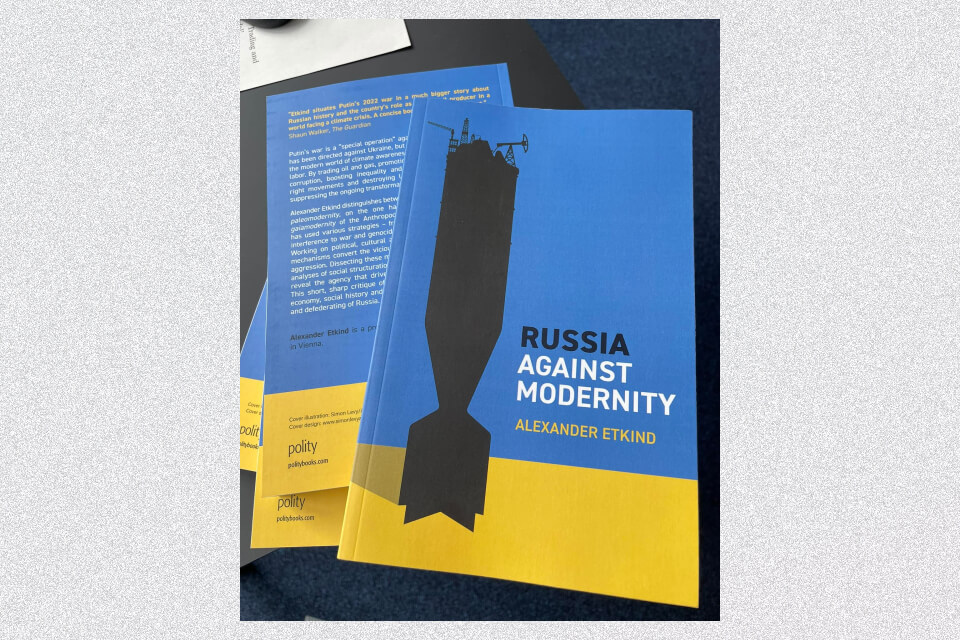
In fairness your book is titled Russia Against Modernity, not Putin Against Modernity.
— Correct, but I call the current war Putin's war, not Russia's. Yes, Russia is a state, but Russia is also a country. I don't blame the Russian people, although in this context, perhaps that would be justified. But I think that there are no bad students, only bad teachers. People simply need to be educated, from kindergarten to university, so that they have a different attitude to nature, to garbage, to fuel, to electricity, to people, to the world.
Other peoples have embraced these new ways of behaving, such as sorting garbage, quite readily. Yes, it is also a question of infrastructure—whether you have the different bins outside—but above all is the question of education. There are no good or bad nations, there is good and bad education. As someone who has worked in education all my life, I know what I am talking about.
You write that the modern state and the people are bound together by trust. Don't you think that the Russian people trust their government quite a bit? Even the public polls, as questionable as they are right now, show a very high index of trust in both Putin and the army.
— The question of trust is the cornerstone of social sciences. It is not measured by sociological surveys in any country, let alone a totalitarian one. In Russia today, sociology ought to remain silent, because it is as much a servant of the regime as are the army, the press, and the courts. None of them can be trusted.
But trust should be measured, let's say, by the average interest rate of a loan. You borrow money from a friend: if you trust each other, the interest rate on that debt will be zero. But in Russia, loans are issued at a very high interest rate—that's the indicator of trust.
And, as Niklas Luhmann, the famous German sociologist, wrote, “A complete absence of trust would prevent [one] even getting up in the morning”. I think that many people in Russia are experiencing this right now.
Another idea you describe in your book is the idea of “normality” for Russia. You call it the key idea after the collapse of the Soviet Union. Has the idea failed?
— This idea of “normality” was dominant in a certain circle of Western Sovietologists, Kremlinologists, and other experts on Russia. I am very critical of this idea, but it was a massive undertaking that was, as I write, a kind of an intellectual “Marshall Plan”.
But all the indices and rates: that of education spending, happiness rates, mortality rates, and the difference in life expectancy between men and women in Russia are, to put it mildly, abnormal. They do not correspond to a country which until recently was considered “normal” by the researchers and which the World Bank transferred into the “rich countries” category.
Do you think such admissions were premature?
— Not necessarily. After all, it was all true until 2014. In Russian folklore, this time period is referred to as the “fat years”. So the researchers didn’t admit the development prematurely, they were just documenting the economic growth without understanding the nature of this phenomenon. Although the sources of this growth were well known then and are even clearer now. In the 21st century, economic growth based on the export of carbon-based resources cannot be considered “normal.”
Outlining the confrontation between Russia and progress, you nevertheless write that Putinism is an international phenomenon. Could you explain what you mean by that? Nowadays it seems that Putinism is contained within the walls of just about a single office.
— Now it is. But this is a direct consequence of the war. Before the war, that was not the case. You remember how the world leaders would come to see Putin and sit at that incredibly stupid table.
The most significant achievement for Putinism was the presidency of Donald Trump. It was the international victory of Putinism as a system of tastes and preferences, as a role model. The great country of America fell under the influence of Russia and voted for a Putinist. But it didn't work a second time.
However, Trump may be right in saying that if he were president, there would be no war. Other sources of influence and impact would have worked. In turn, if there had been no war, the domestic Putinism could have existed, if not thrived, and could have been seen as a respectable enough phenomenon. The war was the fatal mistake of this regime.
Wouldn’t you say that, on the contrary, the war resurrected Putinism, but called it a different name? Everyone is increasing their military spending, thinking first and foremost about national security, all the while government strategies are becoming more primitive. These ideas are all quite Putinist and opposed to modernity.
— This much is true. Yes, on the one hand, the war has undermined the Russian economy, and Russia, no matter how much oil it exports in unmarked tankers, will still drown in its own fossil fuels. But in a broader sense, yes, Putinism is achieving its goals: the European climate program deadlines will surely be postponed, and the “hostile plans” will not come true or will come true later than promised. The war has achieved its goals. The remilitarization of Europe will require large quantities of fuel and lubricants. There is no doubt about it.
It's not just about the fuels and lubricants. This looks like the victory of that very archaic model over modernity. Is Russia defeating modernity?
— No. Not this time.
